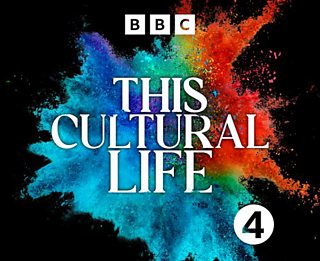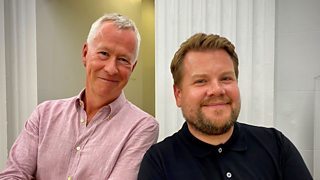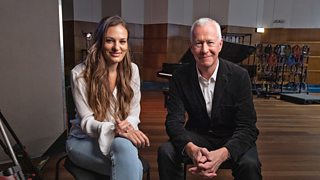Tim Minchin: Nine things we learned from his This Cultural Life interview
Tim Minchin has conquered a lot of worlds. He’s been a cabaret artist, a Perrier Award-winning comedian, an Olivier-winning and Tony-nominated theatrical songwriter, an actor, a singer and a poet. He wrote the songs for the smash-hit stage version of Roald Dahl’s Matilda, which has been running for over a decade in the UK.
He tells This Cultural Life’s John Wilson about his lack of early musical skill, how Matilda changed his life, and how Hollywood nearly brought it all crashing down. Here are nine things we learned.
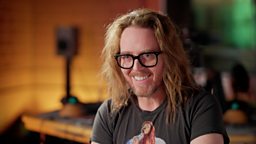
1. He wasn鈥檛 a natural musician
Tim Minchin was born in Northampton, UK, but moved to Perth, Australia, at the age of two. His was not a musical childhood. “[My parents] weren’t musos,” he says. “They had about 20 records or something. Some of it was quite daggy and then a bit of Stones and a bit of The Beatles. There wasn’t music on in the house all the time.” Minchin wasn’t even the musical one in the family. His brother was. “He took up guitar and I learned piano,” he says. “I didn’t really take to music lessons very well, and neither did he, but he was much more interested in music than I was.” It was only through his brother encouraging him that Minchin persisted with the piano.
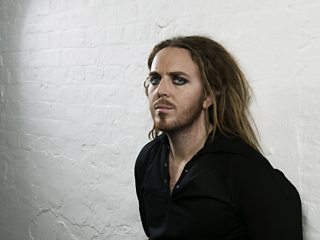
2. He didn’t buy his first piano until 30
Minchin has very limited formal piano training: “I did up to grade three… it isn’t very far.” His musical career was such a slow burn that he didn’t own a proper keyboard until 21 and didn’t buy his first piano until 30. His interest in writing songs began a little before that, when a schoolteacher asked him to write some songs for a school production of Love’s Labour’s Lost for $500 when he was 17. “She said, ‘We have a $500 budget’,” he says. “I sort of thought, ‘I don’t know if I can do that, but if she’s asking me to then she must think I can.’” He did it, it played for three nights and it was a hit with the audience. “God knows if it was good, but I think the songs were fine.”
3. He doesn’t consider himself a comedian
Wikipedia and Minchin’s own official website describe him first as a comedian. Minchin disagrees. “I would consider myself a musician, then probably a writer in a broader sense, then an actor, and then a comedian,” he says. Even though that’s how he’s primarily known, it was never a deliberate career move. “I had no aspirations to comedy,” he says, “and I’d never really watched comedy.” He considered himself a cabaret artist who started getting a lot of laughs. His last comedy tour was in 2011 and he has no plans for more.
4. Ben Folds made him realise pianos could be pop
By adulthood, Minchin knew the piano was his instrument, but he didn’t know how musically versatile that could be. It was hearing Whatever and Ever Amen by Ben Folds Five in 1997 that made him see piano could be cool. “What Ben did was give me hope,” says Minchin. “I later described myself [in the song Rock and Roll Nerd] as… ’I always dreamt of being a star, but I learned piano instead of guitar, which in the 90s doesn’t get you very far.’” He grew up in the grunge era when everything was about guitars. “I can’t sell records. My band won’t go anywhere because it’s too nerdy,” he thought at the time. “Then Ben came along thrashing the hell out of a piano… Ben gave me permission… I don’t have to sit there like a jazz or classical player… There is a place for pop.”
The 2005 guy was a character. It was sort of just a person I was pouring my nerves into, probably.Tim Minchin on his stage persona
5. His stage persona is not the real him
On stage, Minchin usually has wild hair, thick eyeliner, bare feet and a frock coat. Minchin says he developed that look quickly while doing cabaret. “I’ve always had a fairly pragmatic attitude to this,” he says. “I’m not someone who thinks, ‘I’m an artist so they will come because I’m brilliant’. I think, ‘How do I make something that people will really enjoy?’” He decided the most entertaining thing would be to look like a mix of classical musician and wild rockstar – “like Edward Scissorhands crossed with Robert Smith”. He doesn’t think the onstage Tim Minchin and offstage were the same. “He’s very different to my stage persona now,” he says. “The 2005 guy was a character. It was sort of just a person I was pouring my nerves into, probably. I was hiding behind [it].”
6. He doesn’t take criticism well
Tim once wrote a song about a Guardian journalist, Phil Daoust, who gave him a one-star review. “I feel bad about that,” he says. After several years of “getting nowhere”, Minchin went to the Edinburgh Festival, where he got very positive reviews, except from Daoust. “He wrote this utterly sneery, one-star review. Really snobby.” So Minchin retaliated with a song. Asked if he takes criticism better now, Minchin says, “No. I’m better at not reading it. I’ll never be in a situation again where one person’s assessment of me can be so dominant in the digital space, but no I’m not good at taking criticism… Every human is a human and they basically feel the same way you do, whether they’re the president or a kindergarten teacher.”

7. Matilda changed his whole life
In 2008, Minchin was approached by theatre director Matthew Warchus, who asked him to write the songs for a musical of Roald Dahl’s Matilda. Warchus had seen Minchin’s comedy and “he thought my songs were very clever and angular in a way that he thought matched Dahl,” says Minchin. The show was a giant hit – it’s still running – and has now become a movie. “It completely changed my life because I was on this comedy trajectory,” says Minchin. “I always wanted to go back to acting and stuff, but I think I’d basically gone, ‘Satire, that’s obviously my thing.’” Warchus challenged Minchin not to be so self-aware in his songs and to write emotionally and honestly. “I realised he was saying I didn’t need to armour myself with irony and satire. I could just write with words to try to elicit a genuine emotion out of the audience.”
If you want to swim in an ocean like Hollywood you鈥檙e going to find sharks.Tim Minchin
8. He had a horrible time in Hollywood
After the enormous success of Matilda, Minchin was enjoying a period “where everything I touched turned to gold”. Then it stopped. He went to Hollywood because he was asked to write an animated film, Larrikins, for Dreamworks. About animals on a quest across the country, he describes it as “The Lion King but with all Australian humour”. His songs were so well received, and his notes on story so good, that Minchin was asked to co-direct. Then it was cancelled when Dreamworks was sold to another studio. In the same year, his second musical, Groundhog Day, went to Broadway after a successful London run and flopped, closing within six months. It changed his attitude to his work. “I’ve always been like, ‘If you’re really positive and put all your energy into things… you will succeed!’ What it taught me was, you won’t. If you want to swim in an ocean like Hollywood you’re going to find sharks.”
9. You’ve got to take the manure of your life and plant flowers in it
If that last part feels bleak, Minchin doesn’t view it that way. He learned a valuable lesson in Hollywood, but it didn’t change his desire to create things. “The background of all this is that I am just the luckiest, luckiest human in the world,” he says. “I don’t mean that like false modesty. Fundamentally, everything is luck.” After the Larrikins experience, he went back to Australia to spend time with his family and eventually wrote his first album, Apart Together. “If you’re writing about the human condition, which most artists are on some level and I definitely am in quite an explicit way… If that’s your job then all the slings and arrows and blows must be leveraged into your future work.” He sums it up as “Your job is to take the manure of your life and plant flowers in it. Take all those nutrients of grief and rejection and figure out how you can use it to make nice stuff.”
More from 成人快手 Radio 4
-
![]()
Desert Island Discs: Tim Minchin
Musician and comedian Tim Minchin is interviewed by Kirsty Young.
-
![]()
This Cultural Life: Florence Pugh
Actor Florence Pugh talks to John Wilson about her career and formative influences.
-
![]()
This Cultural Life: James Corden
Actor, writer and comedian James Corden reveals what has inspired his own creativity.
-
![]()
This Cultural Life: Nicola Benedetti
Violinist Nicola Benedetti reveals her most important cultural influences.
